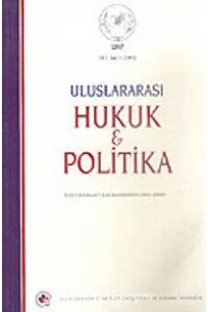PKK/KCK terör örgütünün eylem profili
The action profile of PKK/KCK terrorist organization
___
- Alkan, Necati, “Türkiye’nin Terörizmle Mücadele Deneyimi”, in İhsan Bal and Süleyman Özeren (ed), Dünyadan Örneklerle Terörle Mücadele, (Ankara: USAK Yayınları, 2010), p.109-154.
- Alkan, Necati, Söz Bitmeden: Terörle Mücadelede Önleme Stratejileri, (Ankara: USAK Yayınları, 2007).
- Baker, J. A. and Hamilton, L. H., The Iraq Study Group Report, (New York: Vintage Books, A Division of Random House Inc., 2006).
- Bal, İhsan and Laçiner, Sedat, Ethnic Terrorism in Turkey and the Case of the PKK: Roots, Structure, Survival, and Ideology, (London: Frank Cass, 2004). Bal, İhsan and Özkan, Emre “PKK Terör Örgütü Kronolojisi (1976-2006)”, Uluslararası Hukuk ve Politika Dergisi, Vol. 2, No. 8, 2006, p. 146-156.
- Bal, İhsan, “PKK Terör Örgütü: Tarihsel Süreç ve 28 Mart Diyarbakır Olayları Analizi”, Uluslararası Hukuk ve Politika Dergisi, Vol. 2, No.8, 2007, p. 75-89.
- Bal, İhsan, Alacakaranlıkta Terörle Mücadele ve Komplo Teorileri, (Ankara: USAK Yayınları, 2006).
- Bal, İhsan, Terörizm: Terör, Terörizm ve Küresel Terörle Mücadelede Ulusal ve Bölgesel Deneyimle, (Ankara: USAK Yayınları, 2006).
- Bal, İhsan, Terörle Mücadele Stratejileri Ders Notları, (Ankara: Polis Akademisi, Güvenlik Bilimleri Enstitüsü Doktora Programı, 2006).
- Brunschot, Erin Gibbs Van, “Framing Terrorist Threat: Canada, England and Australia”, in M. Ozguler, A. Ozdogan, A.S. Yayla, E. Mus and H. Iltas (ed), Terrorism: A Global Perspective, (Washington D.C.: TISD, 2009), p. 12-22.
- Cerrah, İbrahim, Demokratik Toplumlarda İçgüvenlik, (Ankara: Polis Akademisi Yayınları, 2011).
- Charlesworth, William R., “Profiling Terrorists: A Taxonomy of Evolutionary Developmental and Situational Causes of a Terrorist Act”, Defence & Security Analysis, Vol. 19, No. 3, 2003, p. 241-264.
- International Strategic Research Organisation, Chronology of PKK Terrorist Organization (1976–2006), http://www.turkishweekly.net/article/217/chronology-of-the-importa nt-events-in-the-world-pkk-chronology-1976-2006-.html
- Davies, Barry, Terörizm, (İstanbul: Truva Yayınları, 2006).
- Ekici, Niyazi, Sözer, M. Alper and Atak, Selçuk “İdeoloji Ve Örgütsel Yapının Örgüte Eleman Kazanma Üzerindeki Etkisi: Türkiye’de Hizbullah Ve DHKP/C Örneği”, Uluslararası Güvenlik ve Terörizm Dergisi, Vol.1, No.1, 2010, p.37-57.
- Emniyet Genel Müdürlüğü, Terör Örgütü PKK/KONGRA GEL, (Ankara: İDB Yayınları, 2006).
- Fasihuddin, “Talibanazitation and Terrorist Attacks in the North-West Frontier Province”, in S. Teymur, H. Ozdemir, O. Başıbüyük, M. Ozer and M. Gunbeyi (ed), Combatting Terrorism, (Washington D.C.: TISD, 2009), p. 157-216.
- Ganor, Boaz, “Defining Terrorism: Is One Man’s Terrorist Another Man’s Freedom Fighter?” Police Practice and Research, Vol. 3, No. 4, 2002, p. 287–304.
- Goldstein, Herman, “Improving Policing: A Problem Approach”, Crime & Delinquency, April 1979, p. 234-258.
- Hudson, Rex A., The Sociology And Psychology of Terrorism: Who Becomes A Terrorist And Why?, (Washington: Library of Congress, 1999).
- Laquer, Walter, Terrorism, (London: Weidenfeld and Nicolson, 1978).
- Lester, David, Yang, Bijou and Lindsay, Mark, “Suicide Bombers: Are Psychological Profiles Possible?” in M. Ozguler, A. Ozdogan, A. S. Yayla, E. Mus and H. İltas (ed), Terrorism: A Global Perspective, (Washington D.C.: TISD, 2009), p. 262-286.
- Marcus, Aliza, Kan ve İnanç: PKK ve Kürt Hareketi, (İstanbul: İletişim Yayınları, 2009).
- Merari, Ariel, “Academic Research and Government Policy on Terrorism”, Terrorism and Political Violence, Vol. 3, No.1, 1991, p. 88-102.
- Özcan, Mehmet Terörün Matruşkası KCK, (İstanbul: Ankara Strateji & Hayat Yayınları, 2012).
- Özcan, N. Ali, PKK: Tarihi, İdeolojisi ve Yöntemi, (Ankara: ASAM Yayınları, 1999).
- Özdemir, Habib, “PKK Terör Örgütünün İstismar Ettiği Çocuklar: Hakkari Örneği”, in Oğuzhan Başıbüyük, M. Alper Sözer and Nurullah Altun (ed), Terörle Mücadelede Makro ve Mikro Perspektifler, (Ankara: Polis Akademisi Yayınları, 2011), p. 69-92.
- Özeren, Süleyman, Sözer, M. Alper and Demirci, Süleyman, “Terör Örgütlerinde Militan Kimlik Profili: Türkiye’de Hizbullah Örneği” in M. Sever, H. Cinoğlu, O. Başıbüyük (ed), Terörün Sosyal Psikolojisi, (Ankara: Polis Akademisi Yayınları, 2010), p. 139-165.
- Özüyılmaz, Ömer and Demir, Adem, “İstanbul İli Örneğinde Terör Suçuna Karışan Şahısların Profili”, in Oğuzhan Başıbüyük, M. Alper Sözer and Nurullah Altun (ed), Terörle Mücadelede Makro ve Mikro Perspektifler (Ankara: Polis Akademisi Yayınları, 2011), p. 105-134.
- Perçin, Ürün and Bilgin, Nuri, “Terörizme İlişkin Algılar ve Sosyal Temsiller,” in Oğuzhan Başıbüyük, M. Alper Sözer and Nurullah Altun (ed), Terörle Mücadelede Makro ve Mikro Perspektifler, (Ankara: Polis Akademisi Yayınları, 2011) p.239-260.
- Şeker, Dilara, Sevimli, Şükran, Akgül, Urungu and Acar, Akif, “Doğu ve Güneydoğu Anadolu’da Terör Suçuna Karışan Bireyler ve Arka Planlarının Değerlendirilmesi”, in Oğuzhan Başıbüyük, M. Alper Sözer and Nurullah Altun (ed), Terörle Mücadelede Makro ve Mikro Perspektifler, (Ankara: Polis Akademisi Yayınları, 2011), p. 165-190.
- Şimsek, Yılmaz, “Profiling PKK Terrorists” in S. Teymur, H. Ozdemir, O. Başıbüyük, M. Ozer and M. Gunbeyi (ed), Combatting Terrorism, (Washington D.C.: TISD, 2009), p. 271-286.
- Uluslararası Stratejik Araştırmalar Kurumu (USAK), Terörle Mücadele Raporu, 2007.
- Vaisman, Reuben, “Profiling Terrorists”, Journal of Police Crisis Negotiations, Vol. 7, No. 1, 2007, p. 27-61.
- Yamaç, Fatih, “PKK/KCK Terör Örgütünün Finansmanı”, Uluslararası Terör ve Sınıraşan Suçlar Sempozyumu, (Antalya: Polis Akademisi, UTSAM, 2011).
- ISSN: 1305-5208
- Yayın Aralığı: 5
- Başlangıç: 2018
- Yayıncı: Uluslararası Stratejik Araştırmalar Kurumu
The action profile of PKK/KCK terrorist organization
Kosova, Abhazya, Güney Osetya ve uluslararası ayrılma (Secession) hakkı
Zorunlu din dersi konusunda AİHM’in yorumu ve sorunun bu doğrultudaki çözümü
International relations studies in Turkey: Theoretical considerations .
Türkiye’de uluslararası ilişkiler çalışmaları: Teorik düşünceler
Değerler ve çıkarlar ikileminde ABD’nin “Arap Baharı”na yönelik politikası
